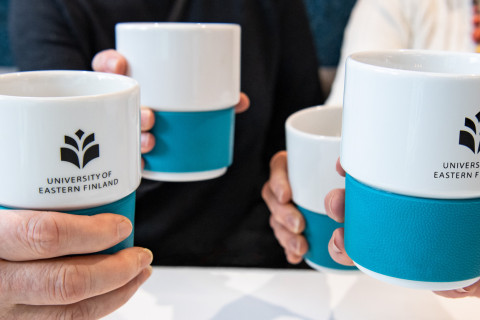The University of Eastern Finland has been awarded funding for five projects for the period 1 August 2022–31 December 2024 amounting to 314,516 euros from the Team Finland Knowledge programme administered by the Finnish National Agency for Education.
The purpose of the Team Finland Knowledge programme is to create and strengthen cooperation between Finnish higher education institutions and the target regions and countries selected to the TFK network, and to design new operating models for cooperation. The awarded funding allows for the creation and strengthened cooperation between UEF and partners in Africa, Latin America, India and China.
The Finland-China Collaborative Training on Global Food Safety: An Approach to Enhance Global Sustainability (GloFoSa) project will implement a course focused on food safety, including virtual lectures, interactive discussion sessions and laboratory training on food microbiology and shelf-life assessment. The project also supports the bilateral academic relations between China and Finland, through the Ministry of Education and Culture’s global programme network, the Finland China Food and Health Network (FCFH). Partnering with UEF on this project are the University of Helsinki (Finland), Hong Kong University (Hong Kong) and Shenzhen University (China). Funding awarded for this project amounts to 71,844 euros at the UEF Institute of Public Health and Clinical Nutrition. Contact persons at UEF: Professor Marjukka Kolehmainen and Dr Suchetana De. The project brief is available on the website of the Finnish National Agency for Education.
The Development of Multidisciplinary Education in Circular Economy (DEDUCE) project aims at designing a joint series of courses on circular economy, sustainability and implications of future environmental technologies through cases studies in India and Finland. The project builds on collaboration already established through the Ministry of Education and Culture’s global programme network, the Finnish Indian Consortia for Research and Education (FICORE). UEF’s partners on this project are the Indian Institute of Technology Delhi, the Indian Institute of Technology Dharwad, and the Indian Institute of Technology Guwahati. Funding awarded for this project amounts to 62,549 euros at the UEF Department of Environmental and Biological Sciences. Contact persons at UEF: Professor Jussi Kukkonen and Dr Victor Carrasco Navarro. The project brief is available on the website of the Finnish National Agency for Education.
The Finnish-Andean Partnership: Training in Food Science and Nutrition to Promote Andean Under-utilised Crops in Sustainable Food Systems (FinAndean) project aims at creating a multidisciplinary online course for masters and doctoral students focusing on Andean crops to shed light on their use, nutritional properties, market potential and contribution to local livelihoods and their role in the creation of resilient and sustainable food systems. The project will address some of the research gaps regarding knowledge of the use, as well as the market and non-market value of Andean crops and their associated traditional knowledge, and consider future challenges associated with climate change. This knowledge will be integrated into the education of future professionals and will be disseminated to the academic community, food innovators, and food businesses globally. UEF’s partners on this project are the University of Turku (Finland), Universidad Nacional Agraria La Molina (Peru), Universidad Mayor de San Simon (Bolivia) and University Innovations Global (USA). Funding awarded for this project amounts to 61,672 euros at the UEF Institute of Public Health and Clinical Nutrition. Contact persons at UEF: Professor Marjukka Kolehmainen and Dr Carlos Gomez Gallego. The project brief is available on the website of the Finnish National Agency for Education.
The project Business and Sustainable Economic Development: African and European Perspectives (BUSEDA) aims to develop a course on practical knowledge about contemporary economic development and business climate in selected African and European countries. The course aims to ignite keen interest towards Africa creating awareness of economic potential and business opportunities in the African countries as well as presenting Finland as an attractive destination for African investments, as an important business partner within the EU, and as a leading innovation centre in certain fields. The project’s long-term aim is to foster closer economic ties between Finland/EU and Africa. UEF’s partners on this project are the Botswana Open University (Botswana), College of Business Education (Tanzania), National University of Lesotho (Lesotho), University of Malawi (Malawi), University of Mauritius (Mauritius) and University of Seychelles (Seychelles). Funding awarded for this project amounts to 59,251 euros at the UEF Karelian Institute. Contact person at UEF: Dr Dmitry Zimin. The project brief is available on the website of the Finnish National Agency for Education.
The project Fostering Green Transition Through Mobility and Effective Communication Between Finnish and Chilean HEIs consolidates collaboration between seven universities in the field of sustainable and circular bioeconomy. The project integrates mobility of staff between Finland and Chile and includes development of curricula and joint research, development and innovation initiatives. in addition, the project will implement a webinar series on bioeconomy. UEF’s partners on this project are Savonia University of Applied Sciences and Karelia University of Applied Sciences from Finland, as well as Universidad Católica del Maule, Universidad de Concepción, Universidad de Talca, and Universidad Austral de Chile from Chile. Funding awarded for this project amounts to 59,200 euros at the UEF School of Forest Sciences. Contact persons at UEF: Dr Piritta Torssonen and Ms Isabel Muñoz Hidalgo. The project brief is available on the website of the Finnish National Agency for Education.
The funded projects will boost the collaborations of the University of Eastern Finland with partners in the Global South and are well aligned to the internationalisation goals in the university strategy, and to the United Nations Sustainable Development Goals.


